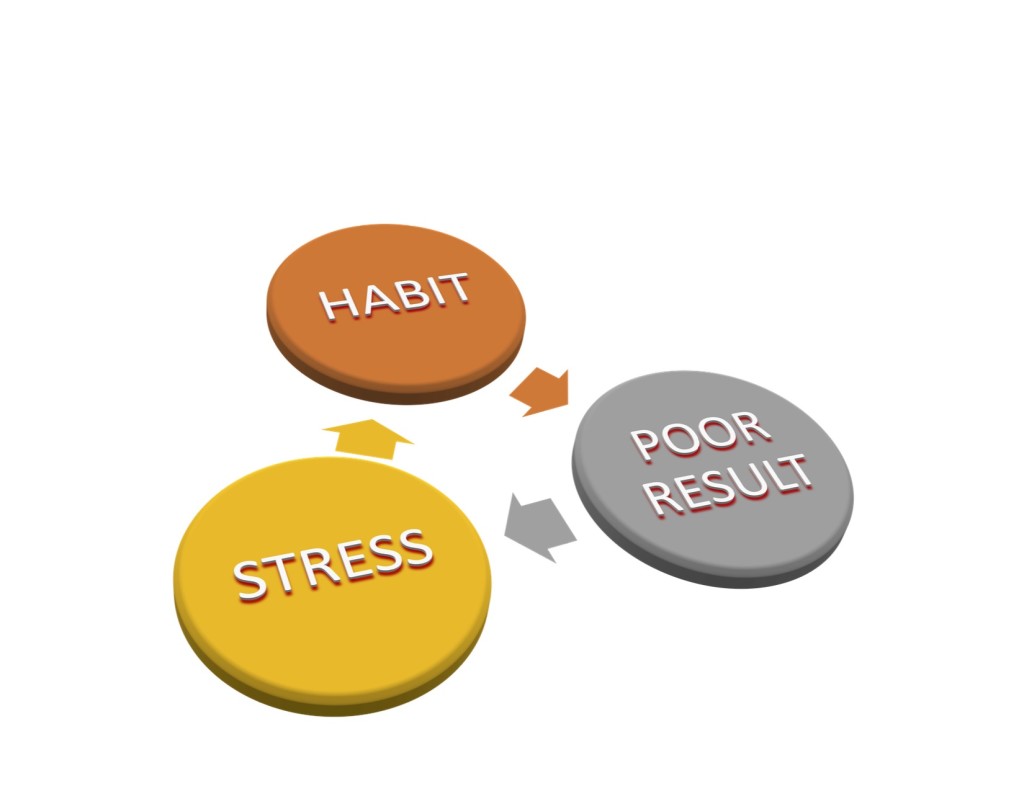Stress enlarges your habit brain and shrinks your decision-making brain.
Chronic stress hormones trigger mindless habits instead of thoughtful action. When you are under chronic stress your brain releases stress hormones (adrenaline, noradrenaline and cortisol) which actually change your brain, enlarging the part of your brain that controls habits and shrinking the part of your brain that makes conscious decisions [1]. The tendency to operate through habits happens immediately when you are stressed out and gets much worse in the days and weeks that follow as the physical changes in your brain take effect [1, 2].
Mindless habits ignore your needs and goals. While habits are really useful things, the habit center of your brain doesn’t take into account really important things like your needs and goals [3]. If you have a habit of eating at the kitchen table then the habit center of your brain will send signals to eat every time you sit down at the table, regardless or whether you are even hungry or if you have just started a diet. You need the decision-making center of your brain in order to choose the action that best meets your current needs and moves your forward toward your goals [4]. So when stress shifts the balance of power from the decision-making center to the habit center you end up doing whatever you did in the same situation in the past even if that behavior has zero chance of helping you meet your needs and goals [5].
So what causes chronic stress?
Chronic stress can come from chronic stressors or chronic remembering. You may have chronic stress because you have continuous stressors, a colicky baby that keeps you up night after night, having chronic pain, a stressful job or just living in a noisy section of town. Stressful and difficult emotional experiences that only happen once in a while or even only happened once can cause chronic stress if you are frequently reminded of the situation, suffer from intrusive thoughts about it or tend to ruminate about what happened. It doesn’t matter if the stress is actually happening over and over or if you are just replaying it over and over in your mind, you still produce the same stress hormones and they still have the same affect on your brain.
Your brain can and will repair itself
The good news is that once you are stress free your brain will immediately begin to repair itself and return you to normal so that you will be as good as new within a few weeks.
WHAT TO DO
Make Safe-and-Secure your home base
Realize that at any moment in your life you are in one of two modes, either in Fight-or-Flight or Safe-and-Secure. When you are in fight-or-flight you are trying to prevent something bad from happening, you are running away from some small or large nightmare. When you are in safe-and-secure you are trying to get something good to happen, you are chasing a small or large dream. Whenever you are not in safe-and secure, you are in fight-or flight and whenever you are in fight-or flight you are producing stress hormones. So the first step is to learn to be aware of when you are in safe-and-secure and then work to be in that mode 95% of the time. If you get triggered often you will need to learn to identify the triggers ( they are always there even if your emotions seem to ‘come out of the blue’) and then either avoid them or get counseling to eliminate them.
Decrease stress by increasing social support
The amount of stress hormones you produce depends on two factors, how much stress you are under and how much social support you have. The more support you have from people that you trust the more stress you can handle without going into fight-ro-flight, without beginning to pump stress hormones that will change your brain.
Get extra zzz’s
Your body reacts to the lack of adequate sleep as a stressor, you actually produce more stress hormones when you under-sleep. Also, when you are undergoing physical or emotional stress your body will need additional sleep, up to 1.5 hours more than usual so it will have extra time to repair and restore you physically and emotionally.
FURTHER READING
1. Dias-Ferreira, E., et al., Chronic stress causes frontostriatal reorganization and affects decision-making. Science, 2009. 325(5940): p. 621-5.
2. Schwabe, L., et al., Concurrent Glucocorticoid and Noradrenergic Activity Shifts Instrumental Behavior from Goal-Directed to Habitual Control. Journal of Neuroscience, 2010. 30(24): p. 8190-8196.
3. Balleine, B.W. and A. Dickinson, The role of incentive learning in instrumental outcome revaluation by sensory-specific satiety. Animal Learning and Behavior, 1998. 26(1): p. 46-59.
4. Corbit, L.H. and B.W. Balleine, The role of prelimbic cortex in instrumental conditioning. Behav Brain Res, 2003. 146(1-2): p. 145-57.
5. Schwabe, L. and O.T. Wolf, Stress increases behavioral resistance to extinction. Psychoneuroendocrinology, 2011.
Web articles:
Stressed Brains Rely On Habits
http://www.the-scientist.com/blog/display/55873/
Does Stress Make Us ‘Creatures of Habit’?
http://abcnews.go.com/Technology/MindMoodNews/story?id=8211974&page=1

Leave a Comment